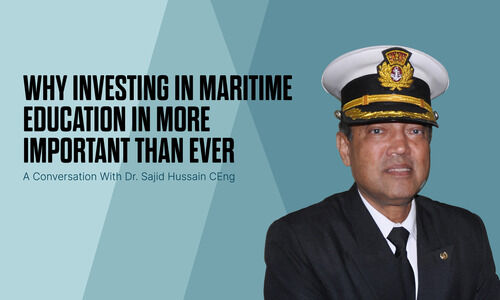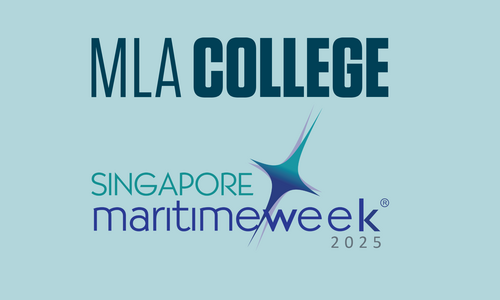

By Capt. Waldemar Wichmann. Master Mariner, MSc, AFNI
Maritime Knowledge and Enterprise Fellow at MLA College
Having commanded vessels in the Polar Regions, I can confidently say that navigating these extreme environments is an unforgettable experience – equal parts challenge and reward. The Arctic and Antarctic seas test not just the limits of vessels but also the skills, adaptability, and leadership of everyone on board. These icy waters hold lessons that extend well beyond navigation charts.
The Challenges of Polar Navigation
Operating in the Polar Regions requires meticulous preparation, cutting-edge technology, and an unshakable focus on safety. Ice coverage, unpredictable weather, and limited infrastructure create an environment like no other. Communication can be patchy at best, and the remoteness of these regions means there is little room for error.
One of the biggest challenges is managing the risks posed by ice. Reading ice charts, anticipating movements, and coordinating schedule with expedition leaders. Even with today’s advanced satellite imagery and navigational tools, experience and gut instinct remain invaluable in making the right call.
Leadership in Remote and Extreme Conditions
Commanding a vessel in these harsh conditions calls for more than just technical know-how—it demands strong leadership. Decisions often need to be made quickly, with limited information. Building trust and collaboration within the crew is vital; everyone needs to understand their role and feel confident contributing to the team’s success.
Leadership also means looking after the crew’s mental and physical well-being. Isolation, freezing temperatures, and long hours can weigh heavily on morale. Creating a supportive and resilient environment on board is essential to keeping everyone motivated and focused.
Risk Management and Adaptive Thinking
Risk management is a constant in the Polar Regions. From knowing your vessel’s limitations to preparing for emergencies, every action must be carefully thought out. Contingency planning isn’t just helpful; it’s critical. Even a small issue can escalate quickly when you’re far from help.
Flexibility is just as important as planning. In the Polar Regions, conditions can shift rapidly, and sticking rigidly to a plan often doesn’t work. Success comes from adapting to the unexpected and finding creative solutions on the fly.
Integrating the Three Pillars of Sustainable Development
Navigating the Polar Regions offers a unique perspective on the three pillars of sustainable development: environmental, economic, and social sustainability.
1. Environmental Sustainability: Operating in such pristine ecosystems underscores the importance of minimizing environmental impact. From using fuel-efficient technologies to adhering to strict pollution controls, every action must prioritize the preservation of these fragile environments.
2. Economic Sustainability: Efficient navigation and resource management are critical in the Polar Regions, where logistical challenges and high costs can strain budgets. Balancing economic viability with sustainable practices ensures long-term success for both operators and the broader maritime industry.
3. Social Sustainability: The welfare of the crew is paramount. Navigating remote areas requires fostering a strong sense of community, ensuring safety, and providing the support needed to thrive under extreme conditions. Additionally, respecting the cultural heritage and rights of Indigenous communities in Polar Regions is essential to responsible operations.
Preparing for Polar Challenges Through Education
The lessons learned in the Polar Regions align closely with the goals of the BSc Sustainable Maritime Operations and MSc Sustainable Maritime Operations programmes. These courses prepare students to address the environmental, economic, and social dimensions of sustainable development in extreme environments like the Polar Regions.
1. Environmental Dimension: Students learn about environmental management practices that minimize human impact on fragile ecosystems, equipping them to operate responsibly in areas like the Polar Regions.
2. Economic Dimension: The programmes emphasize the importance of balancing operational efficiency with sustainable practices, ensuring long-term economic viability even in challenging environments.
3. Social Dimension: Leadership training focuses on fostering inclusive, safe, and resilient teams while respecting the rights and cultural heritage of communities impacted by maritime activities.
Through this integrated approach, these courses empower future maritime professionals to navigate the complexities of modern operations with a strong commitment to the three pillars of sustainable development.
Final Thoughts
Navigating the Polar Regions exemplifies the intersection of the three pillars of sustainable development. It reminds us of the need for environmental stewardship to protect fragile ecosystems, economic sustainability to ensure operational viability, and social responsibility to support crew welfare and respect local communities. These principles are not just theoretical; they are the foundation for effective and ethical maritime operations.
At MLA College, our BSc and MSc Sustainable Maritime Operations programmes are designed to instil these values in future maritime professionals. By integrating advanced navigation techniques, environmental management strategies, and leadership skills, we prepare students to tackle the unique challenges of operating in extreme environments like the Polar Regions.
The Polar Regions serve as a microcosm of broader maritime challenges—complex, unpredictable, and demanding. Yet, with the right preparation, adaptability, and commitment to sustainability, we can navigate these waters responsibly and successfully. For those ready to embark on this journey, the skills and knowledge gained at MLA College provide the compass needed to steer a course toward a sustainable maritime future.



Receive course information, offers, news and general infromation about MLA, sign up today
MLA College Ltd is a company registered in England and Wales. Registered number: 9188277. Registered office: The Merchant, St Andrew Street, Plymouth, PL1 2AX
copyright 2014 - 2025 - MLA College - Online and Distance Learning Courses.Designed and developed by Vertical Plus